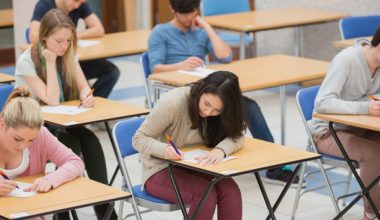Academic skills are the foundation of success in higher education and are crucial for students to develop to achieve their academic and professional goals.
In 2023, the academic landscape has changed significantly, and new skills are required to succeed in this dynamic environment. This article will discuss the critical intellectual skills students need to develop in 2023 and how to select the best ones for their personal and professional growth.
First, we will define academic skills and explain why they are essential in 2023. We will then identify the key skills students need to develop, such as critical thinking, problem-solving, and communication skills.
The article will also explore the various resources available to students to help them develop academic skills. Let’s dive right in!

Table of contents
- What are Academic Skills?
- Top 10 Academic Skills in 2023
- Where is the best place students can get academic skills?
- What factors should students consider when selecting the best academic skills?
- How can students assess their current academic skillset and identify areas for improvement?
- How can developing academic skills impact a student’s future career success?
- What is the importance of academic skills?
- Frequently Asked Questions
- In Conclusion,
- References
- Recommendations
What are Academic Skills?
Academic skills refer to a set of abilities and competencies that are necessary for academic success. These skills include a range of cognitive, social, and emotional abilities, such as critical thinking, problem-solving, effective communication, collaboration, research and analytical skills, time management, and study skills.
These skills are essential for students to succeed in higher education and prepare them for future careers. Students can develop academic skills through various educational activities, such as lectures, discussions, assignments, research projects, extracurricular activities, and practical experiences.
You should see this related article: What does an Electric Filter do? (Full explanation with FAQs)
Top 10 Academic Skills in 2023
#1. Time management
The ability to organize and schedule your time efficiently is time management. You may have used these skills in school to study more effectively or to devote enough time to working on multiple assignments. Working with deadlines is common, and knowing how to manage your schedule can help you be more productive.
To improve your time management skills, keep a planner or set timers.
#2. Research skill set
Students are frequently required to conduct research for academic assignments such as projects or essays. These abilities include knowing what questions to ask, locating credible sources, and employing effective search strategies. Well-developed research skills benefit careers in journalism, analysis, and even some medical fields.
Check out this article: What Are the Different Types of Executive-Level Jobs in 2023? How to Apply.
#3. Reading skills
Reading comprehension is the ability to comprehend what you’ve read. This ability can assist you in studying for tests, conducting research, and writing papers. In the workplace, you may need to use these abilities to comprehend written instructions, gather information, or communicate with coworkers.
Reading books and articles, taking language arts classes, and expanding your vocabulary can all help you improve your reading comprehension skills.
#4. I.T Savvy skills
Understanding how computers work can help you perform better at school and work. You can use a computer to draft written assignments, create graphics, conduct research, and run software.
Consider taking a computer skills class to improve your fundamental computer knowledge.
Read this article: What Does a Chief Cook Do? Full Explanations with FAQs.
#5. Self-control
The ability to motivate oneself is self-discipline. Effective self-discipline, like time management, can help you focus and prioritize your tasks.
Many jobs require you to work independently or with limited supervision, so improving your self-discipline may allow you to work effectively in solitary conditions.
Setting goals and using organizational tools like planners and to-do lists can help you stay focused and motivated.
#6. Critical thinking
Critical thinking is a skill that allows you to analyze information effectively. It enables you to solve problems and comprehend concepts. You may face challenges or urgent situations at work that require you to use critical thinking to address them.
Try mindfulness techniques, learn more about your field, or use apps that focus on improving these skills to improve your critical-thinking skills.
Have you seen this article: What Is ESOL In Education? (Full Explanation With Faqs)
#7. Collaborative skills
Many classes assign group projects or other activities that require students to collaborate.
Working productively in a group can help you improve your communication, leadership, and conflict-resolution skills. You may work on projects in your career that involve a team or other departments.
#8. Presentation and public speaking skills
Presentation skills are a set of abilities that enable you to confidently and effectively deliver an oral presentation. These abilities include using eye contact and body language to your advantage, engaging in assertive communication, and creating valuable presentation materials such as slides or printed documents.
Take a public speaking course or practice with friends or family and ask for feedback to improve your presentation skills.
Check out this article: What is Intervention in Education (Full Explanation with FAQs)
#9. Writing skills
Strong writing skills can help you take better notes, write better essays, and communicate more effectively. Many jobs rely heavily on written communication, such as emails, memos, and progress reports.
Writing clearly and effectively can assist you in expressing your thoughts and improve your collaboration skills. Consider taking a class, workshop, or reading guide to improving your writing.
#10. Goal-setting
Setting and managing attainable goals can improve your focus and productivity. You can use goal-planning skills to create and monitor plans for both work and school environments.
Read this article: What Is Seminary School? Why I will prefer Seminary School.
#11. Being open to constructive criticism
Teachers evaluate your work in school to see if you understand the material. Supervisors and managers may give you performance reviews or comment on your job performance as you work throughout your career. The ability to process and respond to constructive criticism effectively can help you maintain positive relationships and learn to use feedback for self-improvement.
#12. The ability to multi-task
The ability to work on multiple projects at the same time is referred to as multitasking. You can use these skills in an academic setting to complete assignments for all your classes. You may have multiple responsibilities and tasks at work. Improving your ability to prioritize, organize, and complete these tasks can help you succeed.
You should see this article: What is the Hardest Year of High School? How to Scale Through.
Where is the best place students can get academic skills?
There are various places where students can acquire academic skills. Here are a few options:
Schools and universities
Schools and universities offer formal education that provides students with various academic skills. Students can take courses and attend workshops designed to teach academic skills such as critical thinking, problem-solving, and effective communication.
Online resources
There are many online resources that offer academic skill development, such as Massive Open Online Courses (MOOCs), webinars, and tutorials. These resources are often free or low-cost.
Read this article: What is a Quaker School? (Full Explanation with FAQs)
Tutoring and coaching services
Tutoring and coaching services can provide students one-on-one guidance on developing specific academic skills.
Peer support
Students can also learn academic skills from their peers. Peer support can involve group study sessions, peer tutoring, or collaborative projects. Working with peers can help students learn from one another and develop strong academic skills together.
Workplace training
Some workplaces offer training programs that provide employees with academic skills training. These programs often help employees develop skills specific to their job roles.
Have you seen this article: What Is ESOL In Education? (Full Explanation With Faqs)
What factors should students consider when selecting the best academic skills?
When selecting the best academic skills to focus on, students should consider a variety of factors, including:
- Personal interests: Students should consider their interests and passions when selecting academic skills to develop. Choosing abilities that align with their interests can make learning more enjoyable and engaging.
- Learning style: Students should consider their preferred learning style when developing academic skills. Some students learn better through hands-on experiences, while others prefer lectures or group discussions.
- Career aspirations: Students should consider their future career aspirations when selecting academic skills to develop. Choosing skills relevant to their desired career path can enhance their job prospects and make them more competitive in the job market.
- Relevance to the academic program: Students should consider the significance of the skills to their educational program. Certain skills may be more useful in specific fields of study, so students should focus on skills relevant to their program.
- Availability of resources: Students should consider the availability of resources to help them develop academic skills. Resources can include courses, workshops, mentors, and online materials.
- Transferability: Students should consider the transferability of the skills to other areas of their life.
By considering these factors, students can select the best academic skills to develop for personal and professional growth. It is important to note that creating a diverse range of academic skills can provide students with a well-rounded skill set that can enhance their academic and professional success.
How can students assess their current academic skillset and identify areas for improvement?
To assess their current academic skillset and identify areas for improvement, students can follow these steps:
- Self-assessment: Students can start by reflecting on their academic performance and identifying areas where they excel and places where they struggle. They can ask themselves: What academic tasks come quickly to me? What academic tasks do I find challenging? What are my strengths and weaknesses?
- Peer feedback: Students can seek peer or professor feedback on their academic performance. This feedback can help students identify areas where they need to improve and places where they excel.
- Reviewing academic assessments: Students can check their past academic assessments, such as exams, essays, and assignments, to identify areas where they struggled and excelled.
- Assessment tools: Students can take online assessment tools or quizzes to assess academic skills. These tools can provide students with an objective evaluation of their strengths and weaknesses in various intellectual skills.
- Personal goals: Students can identify their academic goals and areas they want to improve. They can then focus on developing skills aligning with their goals and areas they want to improve.
Once students have identified areas for improvement, they can take steps to develop their skills. This can include seeking help from tutors, professors, or peers, taking courses or workshops, practicing new skills through assignments or projects, and seeking feedback on their progress. Students can enhance their academic and professional success by continuously assessing their academic skillset and working to improve their skills.
Check out this article: What is Intervention in Education (Full Explanation with FAQs)
How can developing academic skills impact a student’s future career success?
The development of academic skills can have a significant impact on a student’s future career success in several ways:
- Enhanced job opportunities: Developing strong academic skills can improve students’ job prospects by making them more competitive in the job market. Many employers seek candidates with diverse skills, and a solid academic skillset can make a student stand out from other candidates.
- Adaptability: Developing academic skills such as critical thinking, problem-solving, and communication can enhance a student’s adaptability in the workplace. These skills can help students navigate complex tasks and make strategic decisions in various work environments.
- Improved performance: Developing academic skills can improve a student’s overall academic performance, which can translate to better job performance in the future. Students who develop strong academic skills tend to be more efficient, productive, and innovative in the workplace.
- Career advancement: Developing strong academic skills can lead to career advancement opportunities. As students progress in their careers, they may need to develop new skills or enhance existing ones to take on higher-level positions.
- Lifelong learning: Developing academic skills can instill a love for lifelong learning in students. This love for learning can translate to continued professional development and advancement throughout a student’s career.
Developing academic skills can significantly impact a student’s future career success by enhancing job opportunities, adaptability, performance, and career advancement and instilling a love for lifelong learning.
Read this article: What Is Seminary School? Why I will prefer Seminary School.
What is the importance of academic skills?
Academic skills are essential for students to succeed academically and prepare for future careers. The importance of academic skills are-
Academic success
Academic skills are necessary for students to succeed in their academic pursuits. Students who develop strong academic skills, such as critical thinking, problem-solving, and effective communication, are better equipped to perform well in their classes, earn good grades, and graduate from their programs.
Career readiness
Academic skills are essential for students to develop to prepare them for future careers. Employers seek candidates with diverse skills, including academic skills, such as research, writing, and data analysis. Students who develop strong academic skills are better prepared to meet the demands of the job market and succeed in their careers.
You should see this article: What is the Hardest Year of High School? How to Scale Through.
Lifelong learning
Developing academic skills can instill a love for lifelong learning in students. Students who develop solid academic skills enjoy learning and seek new knowledge and skills throughout their lives.
Personal growth
Developing academic skills can promote personal growth in students. Students who develop strong academic skills, such as critical thinking and problem-solving, can better navigate complex issues in their personal lives and make informed decisions.
Contribution to society
Students who develop strong academic skills can contribute positively to society. They can use their skills to make informed decisions, solve problems, and create innovative solutions to societal challenges.
In summary, academic skills are essential for academic success, career readiness, lifelong learning, personal growth, and social contribution. Developing strong academic skills can provide students with the tools they need to succeed in their academic pursuits and prepare for their future careers.
Have you seen this article: What is a Quaker School? (Full Explanation with FAQs)
Frequently Asked Questions
Examples of academic skills that students should focus on developing in 2023 include critical thinking, problem-solving, communication, collaboration, and technological proficiency.
Students can identify the best academic skills to develop for personal and professional growth by considering their academic interests, learning styles, and career aspirations. They can also seek guidance from academic advisors and mentors.
Yes, online courses and workshops can help students develop academic skills. They allow students to learn and practice new skills in a flexible and convenient format.
Academic skills are essential for a student’s future career success because they prepare students for the demands of the workforce. Employers look for candidates with strong academic skills, such as critical thinking and problem-solving, as these skills are transferable to various industries and job roles.
Students can continue developing their academic skills after they graduate from the university by attending professional development courses and workshops, seeking mentorship opportunities, and engaging in lifelong learning. They can also apply their academic skills in their chosen career field to continue to develop and improve their skillset.
In Conclusion,
Academic skills are essential for students to succeed in higher education and their future careers. This article has provided a comprehensive overview of the crucial academic skills students need to develop, such as critical thinking, problem-solving, and communication skills.
It is crucial for students to continuously develop their academic skills to keep up with the ever-changing academic and professional landscape. By investing in their academic skillset, students can improve their chances of success in higher education and their future careers.
Check out this article: LNAT Universities 2023| Universities that Require an LNAT
References
- https://www.indeed.com
- https://high5test.com/academic-skills/
- https://www.practicaladultinsights.com


